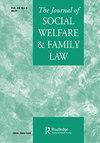在有家庭虐待指控的儿童安置案件中重新审视事实调查
IF 0.6
Q2 LAW
引用次数: 0
摘要
摘要本案例说明考虑了上诉法院关于在存在家庭虐待指控的儿童安置案件中进行事实调查的指导意见,因为上诉法院早些时候就如何处理“强制控制”指控做出了裁决,其中可能包括,也可能不包括身体虐待或性虐待。关于特定事实,在最初的事实调查听证会上,根据“概率平衡”维持的性虐待指控在上诉中被推翻。上诉法院不相信有足够的强奸证据,也不相信有更广泛的强制控制模式。尽管如此,他们还是确认了寻找行为“模式”而不是关注特定事件的重要性。这一判决意义重大,因为它强调了尽量避免诉讼的政策,即使在有家庭虐待指控的情况下也是如此。大力提倡以公共资金为激励的调解替代方案,在许多情况下,这种方案无法提供法律咨询和代表。毫无疑问,这可能是因为对抗性方法的缺陷,其中之一可能是毫无根据的“父母疏远”指控,以对抗家庭虐待指控。然而,调解并不是万能药,在家庭虐待案件中也有其自身的危险,判决中没有提及这些问题。针对儿童安置案件的替代“调查”方法的新试点,可能会在一个继续给法律体系带来重大问题、给儿童和“保护性”非虐待父母带来伤害风险的领域取得突破。本文章由计算机程序翻译,如有差异,请以英文原文为准。
Revisiting fact-finding in child arrangement cases where there are allegations of domestic abuse
ABSTRACT This case note considers the appellate court’s guidance on fact-finding in child arrangement cases where there are allegations of domestic abuse in light of an earlier appellate decision on how to approach allegations of ‘coercive control’ which may, or may not, include physical or sexual abuse. On the particular facts, allegations of sexual abuse, which at the original fact finding hearing were upheld on the ‘balance of probabilities’, were overturned on appeal. The appellate court were not convinced that there was sufficient evidence of rape, or of a broader pattern of coercive control. Nevertheless, they confirmed the importance of looking for a ‘pattern’ of behaviour rather than focusing on specific incidents. The judgment is significant because it highlights the policy of trying to avoid litigation, even where there are allegations of domestic abuse. The alternative of mediation, incentivised with public funding, which not available for legal advice and representation in many instances, is strongly promoted. Undoubtedly, this may be because of the flaws of the adversarial approach, one of which may be unfounded allegations of ‘parental alienation’ to counter allegations of domestic abuse. However, mediation is not a panacea and holds its own dangers in domestic abuse cases, and these are not addressed in the judgment. The new pilots of an alternative ‘investigative’ approach to child arrangement cases, perhaps hold greater promise of a breakthrough in an area which continues to present significant problems for the legal system and risk of harm for children and ‘protective’ non-abusive parents.
求助全文
通过发布文献求助,成功后即可免费获取论文全文。
去求助
来源期刊
CiteScore
2.00
自引率
13.30%
发文量
52
期刊介绍:
The Journal of Social Welfare & Family Law is concerned with social and family law and policy in a UK, European and international context. The policy of the Editors and of the Editorial Board is to provide an interdisciplinary forum to which academics and professionals working in the social welfare and related fields may turn for guidance, comment and informed debate. Features: •Articles •Cases •European Section •Current Development •Ombudsman"s Section •Book Reviews

 求助内容:
求助内容: 应助结果提醒方式:
应助结果提醒方式:


